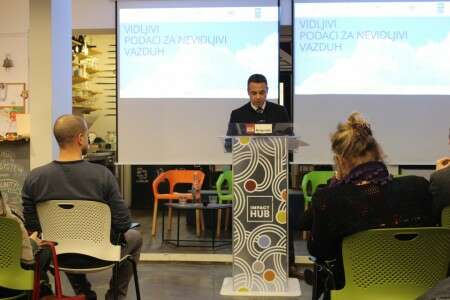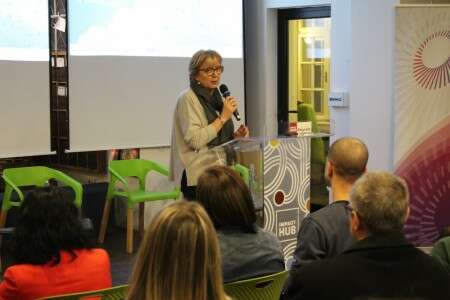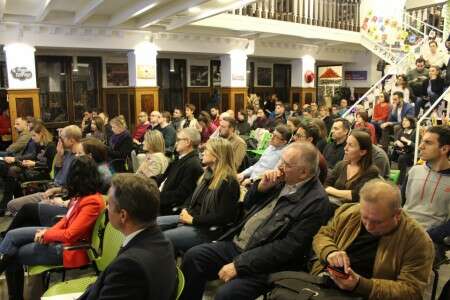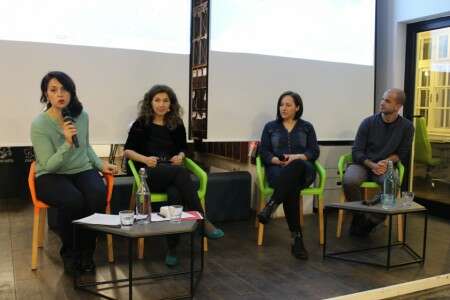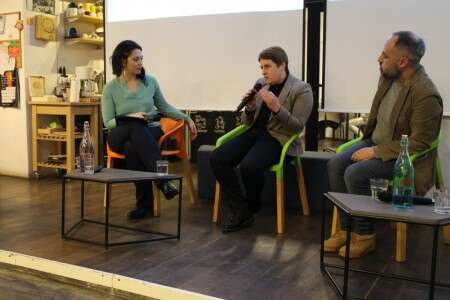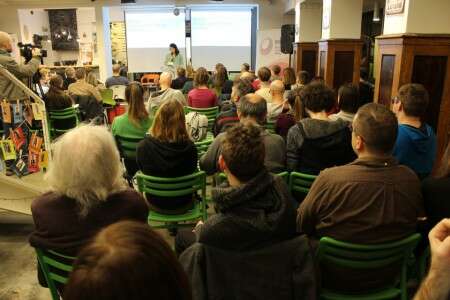Belgrade Open School with IoT company AllThingsTalk and the Internet Society of Serbia, presented the results of the project Visible Data for Invisible Air on Wednesday, January 15th, 2020 at Impact Hub. This project aims to contribute to better quality and availability of air quality data in Serbia through the application of open data principles.
"We are here today because of public policies. Both public policies related to open data and public policies related to air quality, and we will discuss how citizens can actually participate in this. These are the topics we talk about – data and air quality. Topics that have been talked about a lot these days. What the data is? Can we trust them? What's the air like? And what can we do? ” . These are the questions that Mirjana Jovanovic, project manager within the BOS Energy, Climate and Environment program area, opened the event.
The project is based on the principle of citizen science, through which the importance and awareness of the importance of air pollution is enhanced. Through the project, a network of civic air quality measurements has been established, which currently has more than 20 citizens. They participated in the assembly of measuring devices through which they now monitor concentrations of pollutants, and share the collected data on the maker platform. The data is open and accessible to anyone in a machine-readable format.
“Since 2015, the British Government has allocated around £ 20 million to over 60 projects aimed at implementing reforms in the Republic of Serbia. One of the projects we are particularly proud of is „Open Data, Open Opportunities“ which we are implementing in partnership with the Office for IT and eGovernment, UNDP Serbia and the World Bank, within the framework of which the Visible Data for Invisible Air project was launched. When it was approved in June, there was not much talking about air pollution in Belgrade and Serbia, nor of the interest of the media and the general public. Today, thanks to open data and unfortunately obvious pollution, these topics are in the public spotlight. Citizens have become aware and rightly more demanding and proactive. Responsible institutions and local governments started thinking about how much more we could do on this issue. This is the power of open data and I am glad that there are so many of you and this project is expanding to other cities in Serbia,” said Dominic Neil from the British Embassy in Belgrade.
At the event, civic measurement participants shared their experiences and on that occasion, together with Prof. Lidija Stamenkovic and Prof. Dr. Vladimir Djurdjevic also discussed the potential of using artificial intelligence in predicting air quality. The event brought together technology community representatives, civil society representatives, donors and citizens interested in the topic of air pollution, data collection and analysis.
"My primary motive was my wish want to know what kind of air we breathe, but as someone who comes from science, I think anyone who works with geospatial data realizes the value of a data set of this spatial and temporal resolution. On the other hand, I was particularly interested in learning about the quality of this data. I was most interested in which sensor to use and the issue of calibration, as well as measuring air pollution in the winter months when it is in conditions of relatively low air temperature and elevated relative humidity. So I decided to become a participant in a workshop where I learned how to assemble a device, how to program a device, how to connect to an online platform, and ultimately made our measurements visible and accessible to everyone in our environment. This project is important to raise community awareness and drive action. During the measurement of the data, I more often followed the official data than usual. I think the sensor works well and can be indicative. We need to work on the best possible data because of the indicative measurements for personal exposure and exposure in certain parts of the city ” , concluded the participant of the civic measurement of air quality, Gorica Stanojevic.
What is left to citizens in a situation where air pollution is as high as these days? First, to heed the advice of doctors and reduce outside activities. But the most important thing that citizens have at their disposal is to hold the responsibility of their city and municipal administrations, as well as the Ministry of Environmental Protection and the Government of the Republic of Serbia, and require concrete measures to improve air quality. Only in this way, the situation will really improve.
The initiative is supported by the Open Data - Open Opportunities project, implemented by the Office of Information Technology and Electronic Governance and the United Nations Development Program, with support from the World Bank and the United Kingdom Good Governance Fund.
Photo source: Belgrade Open School

